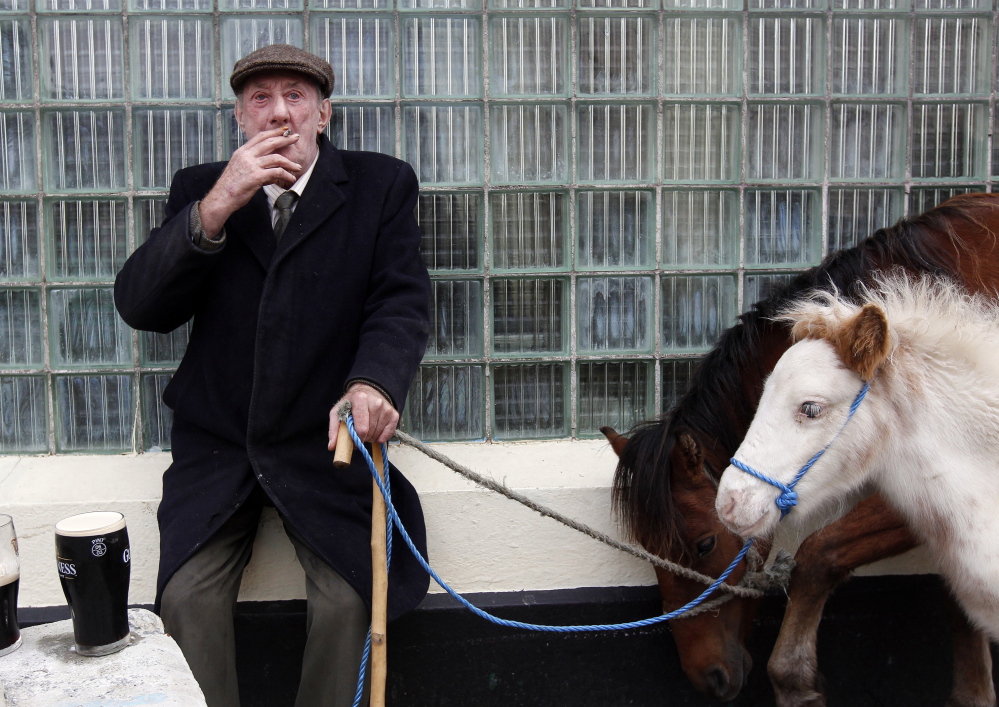DUBLIN — Ireland, ground zero in the battle against smoking, and the United Kingdom are firing the first shots in Europe’s latest war on tobacco, one that may ultimately end up being fought by lawyers.
Cigarettes will be sold in unbranded, olive green packets dominated by graphic images of damaged lungs after Ireland became the first in Europe to legislate for plain packaging, meaning the end of colors associated with brands like Philip Morris International Inc.’s Marlboro.
With the U.K. racing to follow Ireland’s lead, four of the world’s biggest tobacco companies are already preparing to take legal action. The outcome may decide the fate of packaging in the European Union, threatening a $780 billion industry already grappling with falling smoking rates in Europe and the U.S.
“I have a message for the tobacco industry,” James Reilly, the Irish government minister behind the legislation. “They come to pursue us, but they must understand we will win, and we will pursue them for all our costs.”
Within two years, cigarette boxes in Ireland will be standardized, with the health warning doubled to 65 percent of the surface area. Ireland is following the example of Australia, the first country in the world to make such a move.
AUSTRALIA SETS PRECEDENT
In 2012, Australia stopped tobacco companies using brand logos, colors or promotional text on their packaging. While that law is still under challenge at the World Trade Organization, the initiatives in Dublin and London, the first under a new EU-wide tobacco directive, will set the precedent for Europe.
On Monday in London, U.K.’s unelected upper chamber, the House of Lords, is scheduled to vote on a standardized tobacco packaging legislation, after lawmakers in the lower chamber, the House of Commons, backed the plan. The MSCI World Tobacco Index has fallen about 3.3 percent this week.
Tobacco companies said they would challenge the U.K. law, scheduled to come into effect next year.
“I’d expect a long, hard-fought legal battle ahead,” said Foster Corwith, who helps oversee about $36 billion at Causeway Capital LLC in Los Angeles, including British American Tobacco Plc shares.
P.J. Carroll, Ireland’s oldest tobacco firm, now owned by British American Tobacco, said in an email that the legislation amounted to the Irish government taking property from companies without compensation and that would be illegal.
Japan Tobacco Inc. is also among the producers to threaten court action. The others are Philip Morris and Imperial Tobacco Group Plc.
TOBACCO FIGHTS BACK
“Plain packaging is a disproportionate, unjustified and unlawful measure and there is no credible evidence to suggest it will result in public health benefits,” Japan Tobacco said.
Tobacco companies are fighting back, and last year, former New York City Mayor Michael Bloomberg, owner of Bloomberg News parent Bloomberg LP, said he would continue to aid Uruguay as companies fought laws aimed at curtailing branding.
Ireland has a history of setting the tone on tobacco regulation. In 2004, the nation banned smoking in bars and restaurants, a move widely followed in Europe and the U.S.
About 23 percent of Irish adults smoke, down from 25 percent in 2009, though still above the global rate of 20 percent.
“Plain packaging is the biggest single threat to the cigarette industry, especially if it spreads into emerging markets,” said Kenneth Shea, an analyst at Bloomberg Intelligence in New York. “Removing brand imagery differentiation like the Marlboro Man, for example, severely reduces producer pricing power.”
Send questions/comments to the editors.



Success. Please wait for the page to reload. If the page does not reload within 5 seconds, please refresh the page.
Enter your email and password to access comments.
Hi, to comment on stories you must . This profile is in addition to your subscription and website login.
Already have a commenting profile? .
Invalid username/password.
Please check your email to confirm and complete your registration.
Only subscribers are eligible to post comments. Please subscribe or login first for digital access. Here’s why.
Use the form below to reset your password. When you've submitted your account email, we will send an email with a reset code.